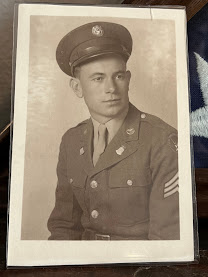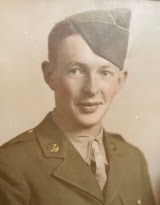On Memorial Day we remember and tell the stories of those men and women who served our country, and especially those whose sacrifice was the most a person can give, their lives. Most of us personally know one or two or more of these beloved soldiers, Marines, sailors, etc., many of whom know deeply the meaning of mayhem.
***
Collateral Damage
By JoAnne Young
Sometimes the scars of the battlefield aren’t only vested on those on the land and seas of the fight. Sometimes, as in this case, the collateral damage has a far reach. This is the story of Betty Long, a survivor of that damage. I didn’t know her or her husband who died in battle. I only know them through a grave marker at Wyuka Cemetery of their baby daughter, and her father’s and mother’s story I felt compelled to learn.
Patricia Ann only lived three months. Her daddy, Sgt. Harold Wesley Long, followed her just a year later, mortally wounded on a battlefield on Leyte Island in the Philippines. He was awarded a Purple Heart and a Silver Star a year after his death for bravery on an earlier European battlefield for nearly single handedly continuing to fire on the enemy, to allow for evacuation of his dead and wounded comrades.
Patricia Ann, who got no time to create lasting memories, was awarded only this: her name engraved in stone for me and others to see walking by some 80 years later. Recognition as her parents’ darling, born September 1943. Died December, same year. The marker also commemorates her father’s death in November 1944.
Mostly, I think of her young mother, Betty, who got no name mention. But with research I learned that Betty, within one year, lost that darling baby, and then her beloved soulmate, who she had married as a teenager.
Betty didn’t remarry for nearly 20 years after that devastating
year, and had no children after Patricia Ann. Before she died in 2016, at age
92, she had also lost her parents, her second husband, and all five of her
siblings. She chose to be buried in Carthage, Missouri, resting forever by her
first love, her soldier. As I am imagining her life, I think maybe, when she
heard of his death so many years before, she had made a secret vow to Wes to be
by his side again someday. He only had to wait 72 years.
***
They Never Really Talked About It….
by Marilyn Moore
My dad, John A. Ruf, M/Sgt., enlisted in the Army at the beginning of WWII. He was assigned to Turner Field in Albany, Georgia, where he was a flight mechanic. Turner Field was the site of pilot training, and Dad was one of the men who kept the planes flying. He didn’t talk about his time in the service. But he kept a few mementos, including a pocket-sized notebook where he recorded the work that he did. His notes indicate precision and attention to detail. To my knowledge, once he completed this tour of duty he never flew again; I think he was a man who was glad to plant his feet on the ground. While he didn’t talk about being in the Army, he did talk about the friends he made there. He and his friend Roger Brown, who lived in Barnesville, Georgia, talked by phone several times a year; given the cost of long-distance phone calls, I know it was an important friendship, one they both valued.Dad’s good friend, Ervin, was one of the soldiers who stormed the beaches at Normandy on D-Day. When I asked him about that, just a few years before he died well into his eighties, he said he never really talked about it. He remembered the other soldiers on that boat that landed in France, describing them as “good boys,” from Nebraska and South Dakota, just good boys. And that some of them didn’t come home.
Several years later I was leading a study at church of Mary Pipher’s book, Another Country. It’s a book about aging, and several members of the group were of my parents’ generation. The conversation one evening diverged to the WWII experiences of those in the group. Of the four men, all had served. One was in the North Africa/Italy theater. One was a Navy officer, based in San Diego. One was aboard a weather ship, in the north Pacific. One was a conscientious objector, assigned to a medic unit in Great Britain. Hesitantly, they acknowledged that they had never really talked much about these years, but that night, they did. As I watched their faces, I saw the knowing glances that passed among them, acknowledging shared experiences that did not need words. I remember feeling honored to be in the room with them during this tender, touching time.
All these men,
my dad, his friends, my church friends, served when asked. They went where they were sent, they did the
jobs that were assigned, they had experiences that were boring and terrifying
and meaningful. They did their part to
make the world safe from fascism. And
when they were discharged, they came back home to become farmers, professors,
ministers, and businessmen. They
married. Four of them had children; two did
not, but became “the second dad” to kids in the family and the neighborhood, who
were grateful. They were part of what
has been described as The Greatest Generation. I do not know if they gave much
thought to their years of service. I
don’t know if they had nightmares from what they had seen. I do know they showed up at ceremonies on
Memorial Day. While their experiences
varied greatly, there is one thing they shared: they never really talked about
it. I wish I had asked….
***
Memories of a brave young woman (my mom) enlisting in World War II
By Mary Kay Roth
We’ll never know for certain why mom joined the WAVES, the women’s branch of the U.S. Naval Reserve in World War II.
Back in the early 1940s she was teaching in a rural one-room schoolhouse and dreamed of adventures awaiting, far from her tiny hometown of Otoe, Nebraska.
 But I’ve always wondered if there
was more. Later in our lives she would show us photographs of her high school
sweetheart, Benjy, who never came home from the war. So, I’ve long suspected that
mom’s plans for a future vanished with him.
But I’ve always wondered if there
was more. Later in our lives she would show us photographs of her high school
sweetheart, Benjy, who never came home from the war. So, I’ve long suspected that
mom’s plans for a future vanished with him.
In the end it doesn’t really matter,
as I’m in awe of her, joining more than 80,000 brave women who served in the
WAVES (Women
Accepted for Volunteer Emergency Service).
A young woman who had never been much
further from home than teacher’s college in Peru, Nebraska – was sent to basic
training at Hunter College in The Bronx.
Years later, when my own children
interviewed “Grandma” for class projects and asked about the scariest thing
she’d ever done – she talked of walking those daunting streets of New York City
and wondering if she should pack up and go home.
She stayed, then hopped a
cross-country train to a major U.S. Naval station in Seattle, Washington.
So many movies from that era picture
military trains during the war. And I wonder if mom sat quietly alone in her
seat, or joined the chatter of the dining car, or listened to music blaring
from train car speakers. I wish I had asked her more.
I do know she arrived in Seattle
where thousands of sailors were stationed – and only a couple hundred WAVES.
She was assigned telephone
switchboard duty at first, though other WAVES worked in wide-ranging tasks:
encoding and decoding messages, sorting mail, serving in naval hospitals and dispensaries.
During those initial months, mom’s work
schedule was erratic, covering nights, then days, then half and half. Apparently, at some point those crazy sleep
patterns created something of a breakdown for her. Letters she kept from the war indicate her
mail was briefly re-routed back to Otoe, then to a different naval station in
Sun Valley, Idaho.
Mom talked about Sun Valley as one
of her favorite experiences in life, a paradise of beautiful landscapes and a
new assignment with a naval psychiatrist who was trying to ease the emotional
scars of fragile sailors. She loved the work.
Of course, somewhere in that first
year of navy service she also met my dad – in a legendary family meet-cute: Mom
ducking into a barracks to adjust the garters on her nylons and dad – an
electrician sailor poised atop a ladder adjusting some wires – looking down
upon what he called the most beautiful pair of legs he had ever seen.
Eventually they married, dad was
assigned to the South Pacific while mom continued in Sun Valley. When the war
ended and everyone came home, men were favored for any and all jobs, and women
were tucked back into their boxes of home and family.
Through the years mom responsibly
ran our household and raised four children, but I always believed she was never
quite at ease in that traditional role.
So, every Memorial Day, I picture
her dressed in those crisp Navy outfits, blue wool in the winter, whites in the
summer – uniforms I still treasure, folded away neatly in my cedar chest.
***
DadBy Mary Reiman
He was 21 when he enlisted. Although he never talked with us about his war experiences, he was proud of his service.
He looks so young in this photograph.
Too young...
***











